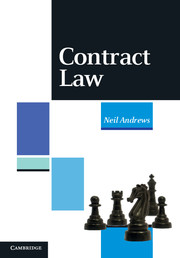Book contents
- Frontmatter
- Contents
- Preface
- Table of cases
- Table of statutes
- Table of statutory instruments
- Part I Introduction
- Part II Formation
- Part III Consideration and intent to create legal relations
- Part IV Third parties and assignment
- Part V Vitiating elements
- Part VI Terms and interpretation
- 12 Terms in general
- 13 Implied terms
- 14 Interpretation and rectification of written contracts
- 15 Exclusion clauses
- Part VII Breakdown and liability
- Part VIII Remedies for breach
- Part IX Illegality and public policy
- Part X The future
- Appendix: A who's who of contract law
- Bibliography
- Index
14 - Interpretation and rectification of written contracts
from Part VI - Terms and interpretation
- Frontmatter
- Contents
- Preface
- Table of cases
- Table of statutes
- Table of statutory instruments
- Part I Introduction
- Part II Formation
- Part III Consideration and intent to create legal relations
- Part IV Third parties and assignment
- Part V Vitiating elements
- Part VI Terms and interpretation
- 12 Terms in general
- 13 Implied terms
- 14 Interpretation and rectification of written contracts
- 15 Exclusion clauses
- Part VII Breakdown and liability
- Part VIII Remedies for breach
- Part IX Illegality and public policy
- Part X The future
- Appendix: A who's who of contract law
- Bibliography
- Index
Summary
INTRODUCTION
Summary of main points
(1) ‘Interpretation [of written contracts] is the ascertainment of meaning which the document would convey to a reasonable person having all the background knowledge which would reasonably have been available to the parties in the situation in which they were at the time of the contract.’ See the quotation from Lord Hoffmann in the Investors Compensation Scheme case (1998) at 14.07.
(2) Interpretation of written contracts is a matter of law, whereas interpretation of contracts not wholly contained in writing is a matter of fact (14.03). Appeal courts have the power to review first instance errors of ‘law’, but in general defer to findings of fact.
(3) The House of Lords in Chartbrook Ltd v. Persimmon Homes Ltd (2009) held that a court can ‘construe’ by wholly recasting a relevant phrase or portion of a written contract when it is obvious that the drafting has gone awry and the parties' true pre-formation shared meaning can be ascertained by consideration of the commercial purpose of the agreement and internal hints in the text (14.21 ff). Such ‘curative interpretation’ has a similar function to the more formal equitable doctrine of ‘rectification’ (see (9) below), because both doctrines have the effect of revising a document. The safer course is to plead both ‘construction’ and ‘rectification’.
[…]
- Type
- Chapter
- Information
- Contract Law , pp. 378 - 417Publisher: Cambridge University PressPrint publication year: 2011



